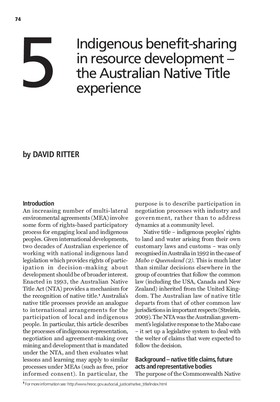Indigenous benefit-sharing in resource development – the Australian Native Title experience (PLA 65)

This article describes the processes of indigenous representation, negotiation and agreement-making over mining and development that is mandated under the Australian Native Title Act (NTA) of 1993. It evaluates the lessons and learning from two decades of experience for similar processes such as FPIC.
The NTA succeeded in giving indigenous people a seat at the bargaining table when a resource developer wanted to mine or explore on land under claim. As a consequence, indigenous communities received large benefits and numerous sites of traditional significance were probably saved from destruction. However, the NTA did not establish a true right to veto, which would have given traditional land holders the power to decide whether or not to participate in the resource economy on a case-by-case basis. It therefore mainly provided a way of bringing traditional indigenous land rights within Australia’s resource economy in an orderly way.
Empowerment and strengthening of customary rules and responsibilities were limited by the predefined processes provided for under the Act. The lack of sufficient resources and expert advice also limited indigenous peoples’ ability to use the rights under the Act to their advantage.
This is Article 5 in Participatory Learning and Action 65 on Biodiversity and Culture: exploring community protocols, rights and consent.
Cite this publication
Available at https://www.iied.org/g03400